|
|
|
Sort Order |
|
|
|
Items / Page
|
|
|
|
|
|
|
| Srl | Item |
| 1 |
ID:
107666
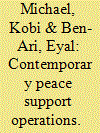

|
|
|
|
|
| Publication |
2011.
|
| Summary/Abstract |
In this article the authors examine two set of issues that constrain contemporary peace support operations (PSOs): one centered on the kinds of knowledge prevalent in PSOs and the second involving the organizational structures that characterize them. The authors' aim is to show the deep discursive and structural limitations and contradictions that continue to characterize the actions of armed forces and the dominance of militaristic thinking within PSOs. This article centers on multidimensional peacekeeping marked by emphasizing two main points in regard to the complex nature of such peacekeeping. First, Western military thinking is still dominant in the professional discourse of peacekeeping despite the fact that in many cases it is less relevant to the arenas where it is applied (in weakened or failed states). Second, forces in second-generation peacekeeping missions are by definition a form of hybrid organizations, and therefore conceptual changes in regard to PSOs not only involve the realm of knowledge but also entail practical consequences for the very organizational means used to achieve their aims. The authors' analysis demonstrates the blending, hybridization, and linkages that are an essential part of PSOs as processes that carry both advantages and disadvantages for organizational action.
|
|
|
|
|
|
|
|
|
|
|
|
|
|
|
|
| 2 |
ID:
104087
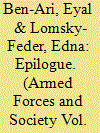

|
|
|
|
|
| Publication |
2011.
|
| Summary/Abstract |
This concluding epilogue places the individual studies presented in the special volume in wider perspective. The importance of studying reserve forces centers on (1) their centrality in missions carried out by the militaries of the contemporary industrial democracies and (2) their unique cultural and organizational characteristics. Concretely, reserve components are a foundation for the legitimacy of the military, yet are often a source for criticism of missions; they provide a ready pool of manpower but one that is sometimes expensive; their skills are sometimes needed but their military abilities do not always meet the perceived standards of standing forces' professionals. Research into this military group that is situated between the military and civil society clarifies not only the interlinkages between these spheres but also their dynamic and contextual nature.
|
|
|
|
|
|
|
|
|
|
|
|
|
|
|
|
| 3 |
ID:
069916
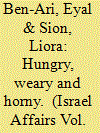

|
|
|
| 4 |
ID:
181153
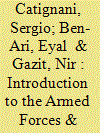

|
|
|
|
|
| Summary/Abstract |
This Armed Forces & Society forum is dedicated to exploring recent trends in the characteristics of military reserves and of the changing character of reserve forces within the armed forces within the military, the civilian sphere, and in between them. To bring new and critical perspectives to the study of reserve forces and civil–military relations, this introduction and the five articles that follow draw on two organizing conceptual models: The first portrays reservists as transmigrants and focuses on the plural membership of reservists in the military and in civilian society and the “travel” between them. The second model focuses on the multiple formal and informal compacts (contracts, agreements, or pacts) between reservists and the military.
|
|
|
|
|
|
|
|
|
|
|
|
|
|
|
|
| 5 |
ID:
181158
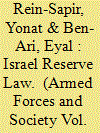

|
|
|
|
|
| Summary/Abstract |
Enacted in 2008, 60 years after Israel Defense Forces was established, the Israeli Reserves Law is a striking expression of the decline of military autonomy in a democratic country. While not aimed at reducing the military’s discretion in regard to the training, deployment, and compensation for reservists, the formal enactment of the Law in effect did so. The legislative process was preceded by a crisis between reservists and the military and was led by several reservists’ organizations who tried to improve the standing and resources allocated to the reserve forces. The article analyzes the impact of these organizations and the coalitions they created with politicians serving in the national parliament, the Knesset. By choosing the legislative option to improve the conditions of service for reservists, they de facto reduced military autonomy since the new Law mandated supervision and monitoring (by civilian institutions) of the service of reservists and extended into the core area of military action, the operational use of force. Thus, the actions of reservists’ organizations turned a bilateral tie between the military and its (reserve) soldiers into a trilateral one, comprising the military, reserve soldiers, and state institutions.
|
|
|
|
|
|
|
|
|
|
|
|
|
|
|
|
| 6 |
ID:
119056
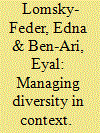

|
|
|
|
|
| Publication |
2013.
|
| Summary/Abstract |
This article is an exploratory study of the factors influencing the management of diversity at the unit level. This management is carried out through ongoing negotiations between troops and commanders and is heavily influenced by the character of the unit within which bargaining takes place and involves the active role of both sides. The most important factors are the unit's structural characteristic (dominant military roles or social composition) and ethos of action (a combat or service orientation). Diversity is thus simultaneously managed as formal policy (intentionally organized) and is self-organized as phenomena emerging at the local level through agreements between the military and individuals and groups serving within it. The analysis is based on qualitative research carried out within the Israel Defense Forces within combat, white-collar, and service units.
|
|
|
|
|
|
|
|
|
|
|
|
|
|
|
|
| 7 |
ID:
190786
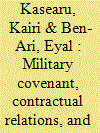

|
|
|
|
|
| Summary/Abstract |
The military covenant is a set of morally binding expectations marking the exchange between military, society, and the state. Its base is the military’s duality: like other large public institutions delivering services and its uniqueness in holding the monopoly over the use of legitimate organized state violence. The covenant is a form of relational (not transactional) contract based on trust between, and a long-term orientation of, partners; it both orders and displays these relations thereby offering both prescriptions for action and discursive means to legitimate them. The covenant can be used as an analytical (not normative) concept for theoretical development in three areas: social change and society-military ties, processual aspects of agreements between individuals and groups and the armed forces, and links between society-military ties and the social contract and social cohesion. We use the case of Estonia to illustrate the theoretical potential of the military covenant.
|
|
|
|
|
|
|
|
|
|
|
|
|
|
|
|
| 8 |
ID:
188794
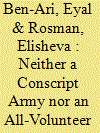

|
|
|
|
|
| Summary/Abstract |
This article develops an analytical model of force composition that combines the advantages of conscription with those of an all-volunteer force. Using Israel as a hypothesis-generating case study, it argues that mandatory military service has undergone changes centered on five key organizing principles: selective conscription, early discharges, elongated lengths of service, forms of voluntary service and differing pay-scales, and other material and non-material incentives for conscripts. These principles are “grafted” onto conscription creating a hybrid, “volunteer-ized” model. The utility of the theoretical model lies in explaining how these principles facilitate mobilizing a needed number or recruits, providing an adequate level of military expertise, as well as maintaining the legitimacy of the armed forces by meeting domestic social, economic, and political expectations about its composition and the use of personnel at its disposal. The system is adaptive and flexible, as shown through the comparisons throughout the paper.
|
|
|
|
|
|
|
|
|
|
|
|
|
|
|
|
| 9 |
ID:
078367
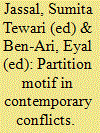

|
|
|
|
|
| Publication |
New Delhi, Sage Publications, 2007.
|
| Description |
381p.
|
| Standard Number |
0761935479
|
|
|
|
|
|
|
|
|
|
|
|
Copies: C:1/I:0,R:0,Q:0
Circulation
| Accession# | Call# | Current Location | Status | Policy | Location |
| 052481 | 303.69/JAS 052481 | Main | On Shelf | General | |
|
|
|
|
| 10 |
ID:
181155
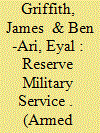

|
|
|
|
|
| Summary/Abstract |
This study examines reserve military service from a perspective of social construction—the ways in which the reservist’s conscious experiences are constructed to give meaning to military service. Content descriptions of conscious experiences of reserve military service are identified in past studies. Constructions fell into four broad categories: (1) complementary to life—reserve military service providing wanted satisfaction not otherwise achieved, material gain, or ideological commitment; (2) equitable arrangement—understood compensation for self-sacrifice; (3) discordant identity—requirements of military life blatantly or surreptitiously conflicting with established identity and civilian life; and (4) self-definition—reserve military service understood as an aspect of self-identity. Directions for integrating these constructions as a basis for future research are identified and discussed.
|
|
|
|
|
|
|
|
|
|
|
|
|
|
|
|
| 11 |
ID:
082696
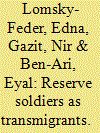

|
|
|
|
|
| Publication |
2008.
|
| Summary/Abstract |
This article suggests a new perspective for examining the particular social and organizational characteristics of military reserves forces and the special experiences of serving in the reserves. To illustrate the unique social position of reservists, the authors develop a theoretical model that likens them to transmigrants. Accordingly, the authors suggest that society may benefit from looking at reserves both as sorts of social and organizational hybrids or amalgams-they are soldiers and civilians, they are outside yet inside the military system, and are invested in both spheres-and as continual migrants journeying between military and civilian spheres. The authors end by suggesting that it may be fruitful to study three segments of the military, each of which has its own dynamics: regulars, conscripts, and reserves. This differentiation allows society to examine different patterns of motivation, cohesion, political commitment and awareness, and long-term considerations that characterize each segment
|
|
|
|
|
|
|
|
|
|
|
|
|
|
|
|
| 12 |
ID:
157892


|
|
|
|
|
| Summary/Abstract |
The special operations forces (SOF) of the industrial democracies have suddenly and rapidly grown in numbers and resources during the past decades. Most explanations for this growth focus on factors external to the armed forces. We argue that the enlargement of SOF is also the result of internal organizational dynamics. First, we compare SOF to other units and military appendages that have grown over the past 30 years in order to delineate what is unique to their development and the special adaptive potential they bring to the armed forces: generalized specialization, boundary spanning roles, and enlargement of military autonomy. Second, we analyze the actions of internal military entrepreneurs and their organizational mentors to show how they use this adaptive potential to “sell” the use of SOF to key policy-makers and decision-makers.
|
|
|
|
|
|
|
|
|
|
|
|
|
|
|
|
|
|
|
|
|